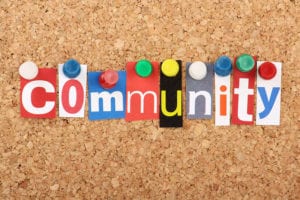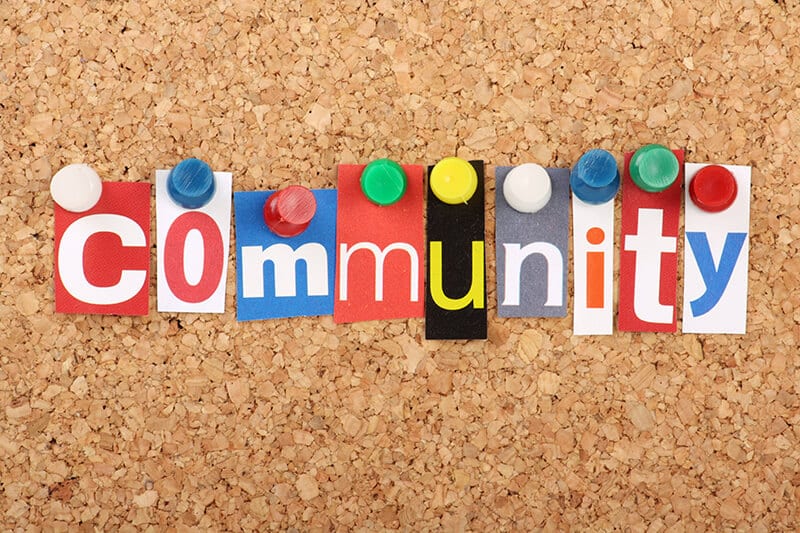 Community. The word always left a bad taste in my mouth. In my life, “community” has meant something awful, something dreadful. And by age 23, I knew that becoming part of a community was something I would fight to avoid at all costs.
Community. The word always left a bad taste in my mouth. In my life, “community” has meant something awful, something dreadful. And by age 23, I knew that becoming part of a community was something I would fight to avoid at all costs.
I think it was just after September 11th 2001 when my confusion began. I was a theater major at Temple University in Philadelphia, PA. When the towers fell, and the flags began to wave, I took solace in the sense of community I felt on campus. There, I was among people who seemed to understand the reality of what was actually happening. This was no War on Terror, but a war for profit; and the masses rallying behind it were getting swindled. It was tremendously comforting to know I was not alone, to know there were many others who had not fallen victim to this great hoax. These people called themselves liberals. So, I supposed I was a liberal too. Then, things began to change.
As professors regularly set aside Aristophanes, Shakespeare, Moliere, and Chekhov to lecture against Bush, Cheney, Rumsfeld, and Rice, I began to notice an odd sort of trend among my fellow students. We no longer debated the significance of literary themes, the merits or downfalls of modern linguistic variations in classical productions, the pros and cons of proscenium versus black box. In fact, we no longer debated much of anything.
Somehow, the consensus we’d reached concerning current events grew into an expectation of consensus in every subject. In just a short time, it seemed we were all expected to approve and to disapprove of all the same things. The intense debates I once enjoyed both in and out of the classroom had turned into patterned exchanges of one-upsmanship, proclaiming, then re-voicing the very same opinions over and over again. My beloved community had become nothing more than an echo chamber. And I was starting to feel suffocated.
 One afternoon, in 2003, I was driving around the city, listening to NPR’s broadcast of the show This American Life. It was the first time I’d heard of Jason Sorens, and The Free State Project. I listened intensely, imagining myself moving to Vermont (which seemed the state most likely to be selected for FSP at the time). I grew more and more excited as the show continued. But after the broadcast ended, I thought, Yeah right…like people will really uproot their lives and move… and soon I forgot about it.
One afternoon, in 2003, I was driving around the city, listening to NPR’s broadcast of the show This American Life. It was the first time I’d heard of Jason Sorens, and The Free State Project. I listened intensely, imagining myself moving to Vermont (which seemed the state most likely to be selected for FSP at the time). I grew more and more excited as the show continued. But after the broadcast ended, I thought, Yeah right…like people will really uproot their lives and move… and soon I forgot about it.
It wasn’t until 2004 that I began to understand that my community’s disdain for the government did not exactly mirror my own. To them, it wasn’t that government was destructive; but that this government, the current administration, was destructive. A few months prior to the 2004 presidential election, professors began attending our Theater 100 assemblies to make announcements to the entire Communications and Theater student body about the importance of voting for John Kerry. While nobody seemed to like Kerry, they all seemed to believe he was the solution to our current problems; that he would end the war, and stop all the fear mongering. It seemed to me that everyone was doing their fair share of fear mongering, and I wasn’t able to understand the great push to vote Kerry. I began to grow disinterested in politics; although I had decided I would vote for a man called David Cobb, whom I’d heard talking on the radio about the importance of legalizing marijuana, and a few other things that just seemed like common sense. Otherwise, I began to retreat from all politics, and all political discussion. I’d had enough. And with my refusal to further participate in the cultural tribalism, I became an outcast.
In the years since college, I’ve found various ways to insulate myself from others. I cut out any lingering friends. I excelled in fields of work that were undesirable but paid plenty, simply because it prevented the necessity of having to work well with others. And although I always kept a boyfriend and a cat in order to preserve my sense of humanity, I was becoming less tolerant, more calloused, set in my ways, and even angry. I was isolated. And I was depressed. Then finally, I met the man who would become my husband.
Like me, Marcus also seemed a bit socially awkward, and as we got to know each other, it became apparent that he had also been cast out by the extreme liberal progressives of Philadelphia. Like me, he’d taken just enough of a stand to let people know he wasn’t part of their collective. So, there we were, two misfits in love in the city of Philadelphia.
When it came time to plan our family, we knew we would have to relocate, and we began to weigh our options. Marcus immediately mentioned New Hampshire, encouraging me to look up The Free State Project (a name that had long before escaped me). I never got around to looking it up. So, we instead went about visiting various states to check out real estate and to try to get a feel for the people. Then, one night, The Free State Project entered my Twitter feed. I ended up on the FSP website for hours, reading and researching the 101 reasons to move to New Hampshire, which prompted me to read the New Hampshire State Constitution. Moved to tears, I excitedly blurted to Marcus, “There’s this thing called the Free State Project. It’s great! We have to move to New Hampshire!” Luckily, Marcus is a patient man, and instead of being exasperated, he was amused. That same night, we began planning our move to New Hampshire.
On Halloween of 2014, with our infant son and pet cat in tow, we made the move. We were met by several other Free Staters who came out on the cold morning of November 1st to help us unload our U-Haul and carry our boxes and furniture into our new home. And since that morning, “community” has taken on an entirely different meaning for me. Among Free Staters, community seems to mean this: A group of people who share one common interest: liberty…and possibly, but not necessarily others. Here, we get to pick and choose freely. We are not obligated to uphold a collective moral standard. We are not forced to support or participate in the efforts or activities of others. But the fact is, I want to!
I am still socially awkward, but for the first time in my life, I regularly seek ways to get involved, ways to meet new people, ways to congregate. I enjoy hearing new ideas, even those with which I might not agree. And I enjoy being able to speak freely among people who might agree, and who might disagree with what I’m saying. Among Free Staters, there are so many different lifestyles, so many different types of activism, and so many different approaches to achieving the ultimate common goal of “Liberty in Our Lifetime.” I can’t think of a better way to live, or a better place to raise a family. And never have I been so comfortable in referring to any other group of people as my community.
Photo credit: www.lccsnj.org

